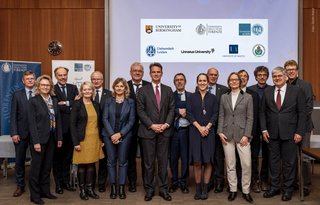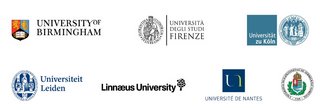The Rectors, Presidents and Vice-Chancellors from seven of Europe’s leading universities met in Köln (Germany) to launch their shared vision for improving European citizens’ quality of life by creating a European University for Well-Being. Through top-level education and research, the alliance will help to create an environment that allows for European citizens and their global neighbours to be well educated, socially responsible, healthy, inclusive and diverse – all critical aspects of well-being.
The leaders of the Universities of Birmingham, Firenze, Köln, Leiden, Linnaeus, Nantes and Semmelweis confirmed the shared missions and values of the partners, and outlined the benefits to be gained from bringing together such a rich diversity of institutions.
To launch the alliance, which will be known as European University for Well-Being (EUniWell), the leaders announced an initial joint seed fund to stimulate research, teaching and policy development partnerships. This will support multilateral projects involving the universities’ 255,000 students and 44,000 staff members across seven European countries.
The initial focus of the alliance is well-being, especially of those people living in cities. In the longer term, the collaboration will define how a modern, civic and entrepreneurial university can support social and individual well-being in a global setting.
Well-being is one of the cornerstones of the European Union and a common European value. Since understanding and improving well-being requires a holistic approach, the collaboration will span research, education, and policy engagement. It will support learning at all ages: not just for university students, but also for life-long learners, and the training of teachers. It will foster equality and diversity, including multilingualism and multiculturalism.
In coming together at this scale and reach, the partner universities in EUniWell recognise their responsibilities for training the next generation of Europeans, enabling scientific breakthroughs and ensuring successful knowledge transfer to benefit society as a whole. As Europe’s next generation, students are the core of the alliance and are involved in all its aspects including governance.
On launching the collaboration, the leaders of the universities in the alliance said:
“We are delighted to combine the forces and strengths of our seven universities. We are creating an ambitious, visionary and distinctive alliance that will support the well-being of our students, staff, cities and regions, and Europe more broadly.
This alliance will show how diversity and working across national boundaries, bringing together diverse but complementary universities, is the best way to address the key issue of the well-being of Europe’s population.”
Professor Sir David Eastwood, Vice-Chancellor and Principal, University of Birmingham, UK.
Professor Luigi Dei, Rector, Università degli Studi di Firenze, Italy.
Professor Axel Freimuth, Rector, Universität zu Köln, Germany.
Professor Carel Stolker, Rector Magnificus and President, Universiteit Leiden, Netherlands.
Professor Peter Aronsson, Vice-Chancellor, Linnaeus University, Sweden.
Professor Olivier Laboux, President, Université de Nantes, France.
Professor Béla Merkely, Rector, Semmelweis University, Hungary.
Media Contact:
Professor Dr. Beatrix Busse
Prorektorin für Lehre und Studium der Universität zu Köln
+49 221 470-7234
prorektorat-lehre-studiumverw.uni-koeln.de
@BeatrixBusse
Professor Dr. Heinz-Peter Mansel
Prorektor für Internationales der Universität zu Köln
+49 221 470-89293
prorektorat-internationalesverw.uni-koeln.de
Press and Communications Team:
Jürgen Rees
+49 221 470-3107
j.reesverw.uni-koeln.de
Notes for editors
- The University of Birmingham is ranked amongst the world’s top 100 institutions and is a member of the UK’s Russell Group of research-intensive universities. Its work brings people from across the world to Birmingham: leading researchers and teachers and more than 8,500 international students from over 150 countries.
- The University of Florence is one of the most important Italian public comprehensive universities with a strong international vocation and a large number of “departments of excellence”. It is a top destination in Europe for Erasmus and has a particularly high number of enrolled international students. Unifi has over 400 cooperation agreements with universities and research centres in 89 different countries and a unique cooperation with the study abroad programme of Stanford, NYU, Syracuse and many of the other 43 US programmes in Florence.
- Universität zu Köln, founded in 1388, is one of the top comprehensive research universities in Germany and a member of the GermanU15 group. Cologne’s students come from 180 countries. Its six faculties and 16 cross-faculty research and teaching centres ensure the high reputation of Cologne’s graduates for both research and the wider market. Among our many internationally renowned research units are four Clusters of Excellence on Aging-associated Diseases, Markets & Public Policy, Plant Sciences and Matter and Light for Quantum Computing, funded within the German Excellence Strategy.
- Leiden University was founded in 1575 and is one of Europe’s leading international research universities. It has seven faculties in the arts, humanities and sciences, spread over locations in Leiden and The Hague including the largest bio-science park in the Netherlands with a unique innovative ecosystem. The University has over 7,100 staff members and 30,800 students. Leiden University is ranked amongst the top 100 universities and listed 38 in THE’s most international universities ranking. Leiden University is member of the League of European Research Universities – LERU.
- Linnaeus University is Sweden’s sixth largest university in terms of number of students, with some 600 partner universities in more than 80 countries. Its nationally and internationally prominent research covers a wide range of disciplines with a number of cutting-edge research environments from ecology and evolution to discrimination and integration, postcolonialism, intermediality, bioscience, and big data.
- The University of Nantes is a comprehensive and multi-disciplinary university with 37,000 students in 20 faculties, in technology, humanities and sciences. It has a strong focus on excellence in teaching and research and two fields of priority in health and industry of the future. Nantes University is ranked amongst the top 200 universities that contribute the most actively to sustainable development objectives addressed by the United Nations (THE university impact rankings) and amongst the top 100 Reuters ranking for Europe’s most innovative universities.
- Based in Budapest, Hungary, Semmelweis University has been a leading biomedical institution of higher education in Hungary and Central Europe for the last 250 years. The university is committed to providing world-renowned education programmes based on its three-pillar mission of education, research and innovation, and health care. A truly international community, university students come from more than 70 different countries, and the international student body accounts for nearly a third of the almost 11,000 students studying at the university’s six faculties.

